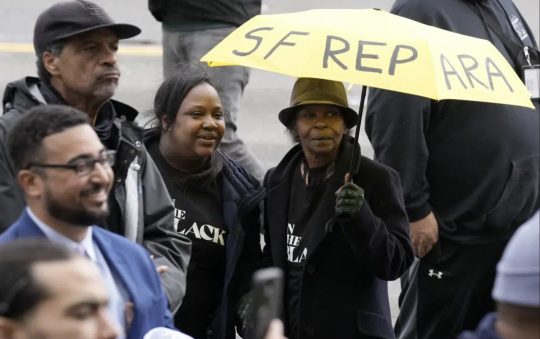
There’s a lesson to be learned from the Confederate flag quickly and unexpectedly falling into disfavor following the murder of nine Bible-studying African Americans, including the pastor, at Emanuel A.M.E. Church in Charleston, S.C. The lesson is that the economic clout of African Americans and their progressive allies can be used to pressure businesses to do the right thing, which in turn can keep the far right wing in check.
With every Southern governor’s mansion, Senate seat and 12 of the 13 Southern Statehouses controlled by Republicans (the Kentucky House is the lone exception), a corrosive sense of helplessness had begun to set in among some Blacks. After all, the majority of Blacks live in the South and once powerful Black Democratic state legislators have been politically neutered now that they are in the minority.
The tragedy in Charleston may have provided us with a blueprint for improving our predicament. First, it’s necessary to understand the role businesses played before and after Nikki Haley, the Republican governor of South Carolina, reversed her long-held position and advocated for the removal of the Confederate flag from the grounds of the state Capitol in Columbia.
According to the New York Times, “The chairman of the South Carolina Chamber of Commerce, an old friend of Ms. Haley’s named Mikee Johnson, polled his 56 board members about the future of the flag. Everyone who responded was of the same opinion. He called Ms. Haley and told her: If she was ready to bring down the Confederate banner, they were behind her.
“So was the South Carolina Manufacturers Alliance, the muscular association that represents giant international companies like BMW and Bridgestone Tire. Over the weekend after the shootings, its president, Mr. Gossett, urged members to draw up a strategy for finally ridding the State House of the flag.”
There were business reasons that motivated this change.
“They were tired of explaining why a symbol of the American Confederacy lingered at the capitol of a state that wanted to lure workers from all over the world,” the Times explained. “To many of them, it was a source of embarrassment that the N.C.A.A. would not pick South Carolina to host championship events because of the flag, and in the college-sports-crazy state, coaches said it was an obstacle to recruiting.”
To be clear, African Americans were at the forefront of this movement long before the business community belatedly flexed its muscles.
On July 15, 1999, the NAACP announced a boycott of South Carolina because it refused to remove the racially offensive flag from the Capitol. Five days later, Dr. Martin Luther King, Jr.’s old organization, the Southern Christian Leadership Conference (SCLC), voted to move its 2000 national convention from Charleston.
The group “Black Lives Matter,” which grew out of the movement to protest the death of African Americans who died at the hands of police, organized an online petition at Moveon.org, collecting signatures at a rate of 5,000 signatures per hour.
And social media, especially Black Twitter, was ablaze.
The floodgates were opened when Gov. Haley pronounced on June 22: “Today, we are here in a moment of unity in our state without ill will, to say it’s time to move the flag from the Capitol grounds. A hundred and fifty years after the end of the Civil War, the time has come.”
Within hours, a stampede of businesses, led by Walmart and Sears, announced they would no longer sell Confederate memorabilia. Other retailers fell in line, including Amazon, eBay, Target and Etsy.com.
This was old-fashioned capitalism at work. Why risk alienating a large base of consumers for the sake of a small segment of lunatics who not only wanted to turn back the clock, but wanted to turn back the calendar?
Leaders throughout the South got the message.
Virginia Democratic Gov. Terry McAuliffe decided Virginia will no longer sell license plates that honor the Old Confederacy. Alabama Republican Gov. Robert Bentley ordered four different Confederate flags at the state Capitol be promptly removed. In Mississippi, House Speaker Philip Gunn, a Republican, called for changing the state flag, which incorporates the Confederate insignia.
With the business community weighing in along with the LBGT (Lesbian, Gay, Bisexual, and Transgender) advocates, we saw a similar retreat over religious freedom legislation in two states.
Indiana Gov. Mike Pence asked state legislators to “clarify” the Religious Freedom Restoration Act that he had already signed into law. In Arkansas, Gov. Asa Hutchinson threatened to veto similar legislation unless it, too, was“clarified” to say that it could not be used to discriminate against gays and lesbians.
In both the Confederate flag and religious freedom controversies, we have seen the clout of business leaders. Black spending power reached $1.1 trillion in 2014, according to the
Selig Center for Economic Growth at the University of Georgia Terry College of Business. It’s time to exercise that clout by putting pressure on businesses, compelling them to apply pressure on Republican lawmakers who work against our interests.
George E. Curry, former editor-in-chief of Emerge magazine, is editor-in-chief of the National Newspaper Publishers Association News Service (NNPA) and BlackPressUSA.com. He is a keynote speaker, moderator, and media coach. Curry can be reached through his Web site, www.georgecurry.com. You can also follow him at www.twitter.com/currygeorge and George E. Curry Fan Page on Facebook. See previous columns at http://www.georgecurry.com/columns.






